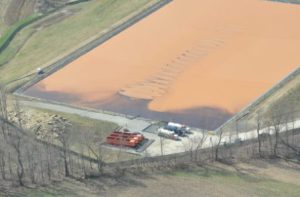By Amanda Gillooly
A Pennsylvania state representative announced this week that he has introduced two new bills in the state House that he said would help further promote responsible Marcellus Shale drilling operations in local communities.
House Bill 1721, the “Fair Frac Disclosure Act,” would mandate the full disclosure of all chemicals used in the hydraulic fracturing process, including the disclosure of compounds labeled as “proprietary” by drilling company vendors and subcontractors.
White said that when companies dump drilling waste water from multiple sites into open-air waste water impoundments, chemicals from the fracking process can mix, react and release into the air or into groundwater if the impoundments leak.
White said that the Fair Frac Disclosure Act would require the state Department of Environmental Protection to maintain a public database of all compounds used by an applicant before a permit could be issued, thus providing transparency and accountability to Pennsylvania residents.
“Local residents who live near industrial drilling operations at the very least deserve to know what chemicals are being put into the air and water as part of the fracking process,” said White, D-Allegheny/Beaver/Washington. “While I applaud the recent news of hydraulic fracturing supplier Baker Hughes deciding to disclose all of its chemicals, not all companies are following suit. This legislation would simply add another layer of protection for our local communities.”
White’s second bill, House Bill 2172, would mandate that air-quality monitoring systems be placed near all natural-gas compressor stations, processing plants and centralized waste water impoundments.
Centralized impoundments have become a controversial issue in western Pennsylvania, with news earlier this month that there was a “significant leak” at a Range Resources pit in Amwell Township, Washington County. The DEP said hundreds of tons of contaminated soil has already been removed, and a source says thousands of tons more may follow suit. The incident spurred the DEP to issue notices of violation to the Southpointe-based Marcellus Shale drilling company.
Under this bill, White said such monitoring systems would be required at all current and future sites as a condition of their permitting. The legislation would require that all air-quality levels recorded by monitoring systems be made publicly accessible through a real-time display posted on the Internet.
White pointed to a recent Associated Press report on preliminary data from the Southwest Pennsylvania Environmental Health Project regarding cases in which residents might have experienced problems as a result of living in close proximity to natural gas drilling operations. To date, the project has discovered 27 cases in which residents developed symptoms and illnesses after nearby operations began.
“Natural gas drilling in our region is here and here to stay, but that does not mean we should ignore simple and commonsense practices that would promote more transparency and provide for honest, fact-based debate,” White said. “When dealing with the health and well-being of our local communities and residents, the public should have access to the scientific facts and figures surrounding drilling in an unfiltered way, and my legislation offers that – nothing more, nothing less.”



